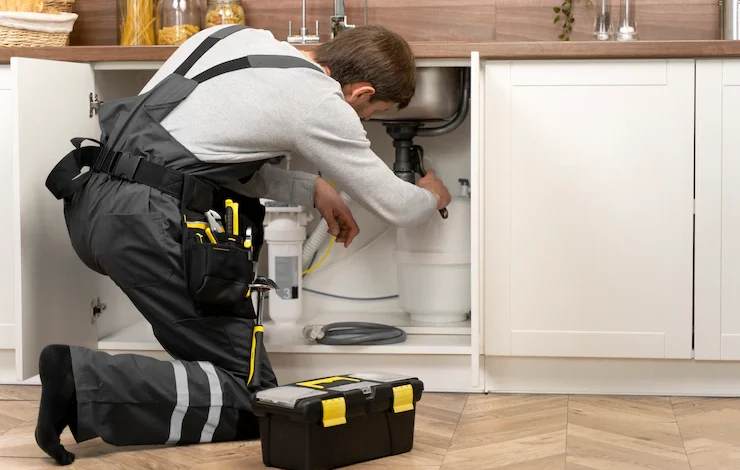How to start a Plumbing services business in South Africa

South Africa’s thriving construction industry and growing demand for plumbing services make it an opportune time to start a plumbing business. Plumbing services are vital for residential, commercial, and industrial properties, ensuring the efficient flow of water, gas, and drainage systems. If you possess plumbing skills and entrepreneurial ambition, this guide will provide you with a step-by-step approach to establishing a successful plumbing services business in South Africa.
Step 1: Develop a Business Plan
Before diving into the plumbing industry, it is essential to create a comprehensive business plan. Your plan should include an executive summary, market analysis, services offered, pricing structure, marketing strategies, financial projections, and a plan for future growth. A well-crafted business plan will serve as a roadmap for your venture and help attract investors or secure financing.
Step 2: Obtain the Necessary Qualifications and Licenses
To operate a plumbing services business in South Africa, you must possess the required qualifications and licenses. Consider enrolling in a recognized plumbing course or apprenticeship program to gain the necessary knowledge and skills. Additionally, obtain the necessary certifications and licenses such as a Plumbing Industry Registration Board (PIRB) license and a valid South African Plumbers Association (SAPGA) membership.
Step 3: Determine Your Target Market and Services
Identify your target market based on location, demographics, and customer needs. Determine whether you want to focus on residential, commercial, or industrial plumbing services or cater to a combination of these sectors. Your services may include general plumbing repairs, installation of fixtures, maintenance, drain cleaning, water heater installation, and other specialized services.
Step 4: Establish Your Business Structure and Register
Choose an appropriate legal structure for your business, such as sole proprietorship, partnership, or company. Register your business with the Companies and Intellectual Property Commission (CIPC) and obtain the necessary tax registrations, such as a South African Revenue Service (SARS) tax number and Value Added Tax (VAT) registration if required.
Step 5: Acquire Equipment and Tools
Invest in high-quality plumbing equipment and tools to provide efficient and reliable services to your clients. Some essential tools may include pipe cutters, wrenches, soldering equipment, leak detection devices, drain snakes, and inspection cameras. Ensure that your equipment is well-maintained and regularly serviced to ensure optimal performance.
Step 6: Develop a Marketing Strategy
Create a marketing strategy to promote your plumbing services and attract customers. Utilize both online and offline marketing channels such as a professional website, social media platforms, search engine optimization (SEO), online directories, local advertisements, and networking with contractors and real estate agents. Word-of-mouth referrals from satisfied customers can also significantly contribute to your business growth.
Step 7: Establish Relationships with Suppliers
Identify reliable suppliers for plumbing materials, fixtures, and spare parts. Maintain good relationships with these suppliers to ensure a steady supply of quality products at competitive prices. Negotiate favorable terms and consider establishing credit facilities to manage cash flow effectively.
Step 8: Provide Excellent Customer Service
Delivering excellent customer service is crucial for the success of your plumbing business. Respond promptly to customer inquiries, arrive on time for appointments, and communicate clearly and professionally. Build a reputation for reliability, integrity, and quality workmanship to foster long-term customer relationships and positive referrals.
Step 9: Stay Updated with Industry Trends
The plumbing industry is continually evolving with new technologies, regulations, and environmentally friendly practices. Stay updated with the latest trends, codes, and standards through ongoing education and participation in industry conferences, trade shows, and workshops. This will enable you to offer innovative solutions to your clients and stay ahead of your competition.
Step 10: Monitor Financial Performance and Adjust Strategies
Regularly monitor your financial performance by tracking income, expenses, and profit margins. Review your business plan periodically and adjust your strategies based on market trends, customer feedback, and changing economic conditions. Continuously seek opportunities for growth and diversification.
Starting a plumbing services business in South Africa requires careful planning, acquiring the necessary qualifications and licenses, developing a solid marketing strategy, and delivering exceptional customer service. By following this comprehensive guide, you can lay a strong foundation for your business and position yourself for success in the growing plumbing industry in South Africa. Remember, perseverance, adaptability, and a commitment to excellence will help your plumbing services business thrive in the competitive market.




